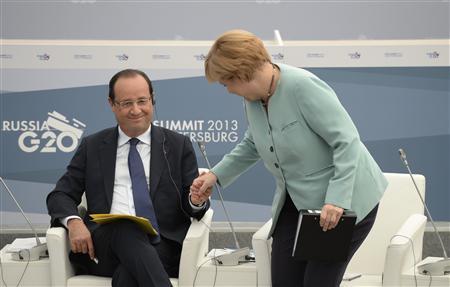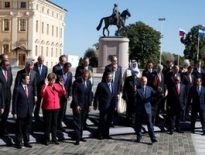(Reuters) – For the first time in at least three years, European leaders have found themselves out of the economic firing line at a Group of 20 summit, with emerging nations’ troubles taking the spotlight.

At previous meetings in Los Cabos, Cannes, Seoul and Toronto since 2010, top of the agenda has usually been Europe’s debt crisis and its impact on financial markets, trade and the global economy. Europe felt whipped; the class dunce.
But nascent signs of a turnaround, with growth and exports slowly picking up, consumer confidence rising and the euro remaining stable, has given the continent respite.
Instead, it has been emerging markets, and particularly uncertainty in India and Brazil, that has been the major point of economic discussion in St. Petersburg.
“I want to tell you, at this G20 we were no longer the focus of attention,” said European Commission President Jose Manuel Barroso, with a sense of relief.
“On the contrary, the words we have received were words of sincere appreciation for our efforts, recognizing that they are starting to bear fruit.”
His assessment was borne out by other officials’ readout on discussions although China was not alone in pressing the European Union to do more to foster growth.
“The structural problems are far from solved and now is no time to be arrogant,” Deputy Finance Minister Zhu Guangyao told reporters on Thursday.
European policymakers are not cracking open the champagne or preparing to rest on their laurels.
While exports and growth have picked up in some euro zone countries, it is by no means across the board. And the structural reforms that are at the heart of Europe’s strategy are not always consistently being put in place.
What’s more unemployment, while no longer rising, is still hovering at record highs of 12 percent. In Greece, Spain and Portugal, youth unemployment is near or above 50 percent.
“We should avoid any kind of complacency, namely because of the high level of unemployment,” said Barroso. “It is critically important in Europe – and also in other parts of the world – that we make all the efforts to make this recovery sustainable over time.”
DRAGHI WARNING
European Central Bank chief Mario Draghi made clear on Thursday that the European recovery was nascent at best and it would be some time before anyone could conclude it was sustainable.
“I am very, very cautious about the recovery,” the Italian said at his monthly news conference following a meeting of the bank’s policy-setting committee. “It’s just the beginning. These shoots are very, very green.”
He left open the possibility that interest rates, already at a record low 0.5 percent, could be cut further.
For European policymakers, the biggest challenge in the coming months and even years is keeping up the pressure on member states to implement the structural reforms to their labor markets and pensions systems that have been promised.
While countries that have received financial aid – Greece, Ireland, Portugal and Cyprus – are under specific programs and have strict reform targets to meet, the bigger concern is larger economies such as France and Italy.
France has been given two extra years to bring its budget deficit down to the EU limit of 3.0 percent of gross domestic product, and was expected to carry out far-reaching reforms to its pensions system as a result. Those reforms have so far fallen short of what EU policymakers expected.
“France is a problem,” a senior EU official said on the sidelines of the G20 summit, adding that President Francois Hollande needed to take further action on pensions.
Italy too is a concern, with political instability surrounding Silvio Berlusconi’s future making it difficult to implement long overdue reforms.
“The biggest threat to the euro zone now is not so much financial instability, it’s political instability,” said the official, cautioning against complacency.
(Editing by Mike Peacock)





